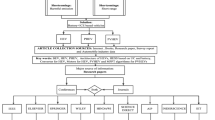Abstract
Russian requirements on energy conservation and energy efficiency are described and analyzed. Deficiencies are noted. The conclusion is that a system with a single control center must be created.
Similar content being viewed by others
REFERENCES
Federal’nyi zakon no. 261-FZ ot 23 noyabrya 2009 g. “Ob energosberezhenii i o povyshenii energeticheskoi effektivnosti i o vnesenii izmenenii v otdel’nye zakonodatel’nye akty Rossiiskoi Federatsii” (Federal Law No. 261-FZ of November 23, 2009 “On Energy Conservation and Energy Efficiency Improvement and on Amendments to Certain Legislative Acts of the Russian Federation”), Moscow, 2009.
Federal’nyi zakon no. 315-FZ ot 1 dekabrya 2007 g. “O samoreguliruemykh organizatsiyakh” (Federal Law No. 315-FZ of December 1, 2017 “About Self-Regulating Organizations”), Moscow, 2007.
Prikaz Minekonomrazvitiya Rossii no. 310 ot 25 maya 2020 g. “Ob utverzhdenii trebovanii k provedeniyu energeticheskogo obsledovaniya, rezul’tatam energeticheskogo obsledovaniya (energeticheskomu pasportu i otchetu o provedenii energeticheskogo obsledovaniya)” (Order of the Ministry of Economic Development of the Russian Federation No. 310 of May 25, 2020 “On Approval of the Requirements for Conducting an Energy Survey, the Results of an Energy Survey (Energy Passport and Energy Survey Report)”), Moscow, 2020.
GOST (State Standard) R 51379-99: Energy Conservation. Power Engineering Certificate of Fuel-Energy Resources for Industrial Consumer. Basic Rules. Standard Forms, 2000.
Golov, R.S., Myl’nik, A.V., and Prokof’ev, D.A., Fundamentals of building energy-efficient clusters in the high-tech industry, Ekon. Upr. Mashinostr., 2017, no. 5, pp. 26–29.
Golov, R.S. and Teplyshev, V.Yu., Key factors and sources of the economic effect of the implementation of energy saving measures in the industry, Ekon. Upr. Mashinostr., 2016, no. 2, pp. 33–36.
Palamarchuk, A.G., Formation of innovative energy-efficient clusters in the context of competitiveness improving of the Russian high-tech industry (part 1), Ekon. Upr. Mashinostr., 2019, no. 1, pp. 29–31.
Palamarchuk, A.G., Formation of innovative energy-efficient clusters in the context of competitiveness improving of the Russian high-tech industry (part 2), Ekon. Upr. Mashinostr., 2019, no. 2, pp. 18–21.
Golov, R.S., Smirnov, V.G., Teplyshev, V.Yu., et al., Energy management system for an industrial enterprise, Russ. Eng. Res., 2021, vol. 41, pp. 1275–1276. https://doi.org/10.3103/S1068798X21120182
Smirnov, V.G., Basic principles of the development of an energy saving management system in industry, Ekon. Upr. Mashinostr., 2014, no. 5, pp. 43–45.
Author information
Authors and Affiliations
Corresponding authors
Additional information
Translated by B. Gilbert
About this article
Cite this article
Golov, R.S., Smirnov, V.G., Teplyshev, V.Y. et al. Energy Efficiency Requirements at Russian Industrial Enterprises. Russ. Engin. Res. 42, 398–400 (2022). https://doi.org/10.3103/S1068798X22040104
Received:
Revised:
Accepted:
Published:
Issue Date:
DOI: https://doi.org/10.3103/S1068798X22040104




